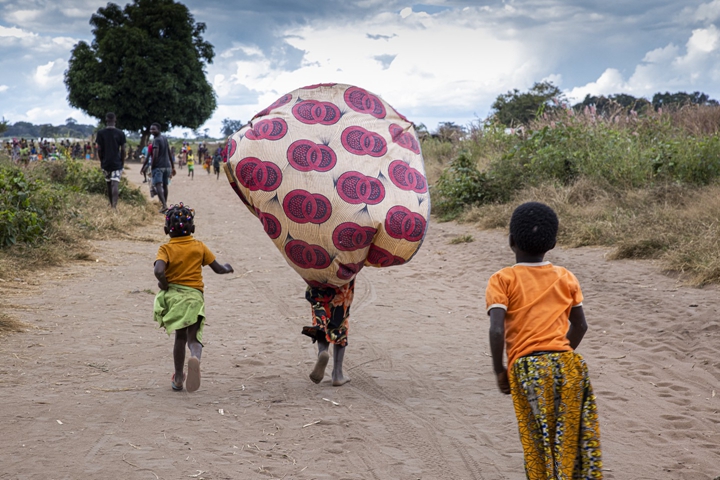Mozambique: A Crisis in Paradise
Text by Agus Morales
Photos by Núria López Torres
Abridged by Syharn Shen (沈思含)
Mozambique: A Crisis in Paradise
Text by Agus Morales
Photos by Núria López Torres
Abridged by Syharn Shen (沈思含)

Norata Atanasio Kumwela, 52, fled the war and now cannot sleep. Nightmares and anxiety haunt her. This is her hut in a camp in the Mueda district of Cabo Delgado province.
In the lush yet strife-ridden province of Cabo Delgado in northern Mozambique, a hidden war rages, displacing nearly a million people from their homes. Militant groups, collectively known as Al Shabab, are locked in conflict with Mozambican and international forces. This region, abundant in natural riches such as gold, rubies, and graphite, also hosts a significant gas project by Total Energies, now stalled due to the ongoing conflict. Despite its low profile on the global stage, the war's implications are closely monitored by various international actors.
UN data reveals that more than 850,000 people have been uprooted by the violence, with many attempting to return home despite the devastation. Among them, Norata Atanasio Kumwela, 52, embodies the human cost of this conflict. Settled in a bamboo hut in the Nandimba camp, Norata's physical frailty and psychological scars offer a glimpse into the ordeal faced by many. She recounts her harrowing escape with her family and the subsequent struggles, including illness and the loss of her husband. "Many children died of hunger," she recalls. The psychological toll of her experiences is palpable, yet the support from Doctors Without Borders, particularly through psychological sessions and a simple beaded bracelet, has offered her a semblance of solace.

Water scarcity plagues the Mueda plateau in Cabo Delgado province. The problem intensifies in displacement camps like this one, located in the town of Lyanda.
The Nandimba camp, housing over 7,000 displaced persons, reflects a community striving for normalcy amidst dire conditions. The residents, like Fernando Rafael Shuk, 55, share stories of survival against the backdrop of repeated attacks and displacement. Fernando's account of escaping with his family, only to encounter further violence, underscores the relentless nature of the conflict. "I survived. Despite everything, I came out alive," he says, detailing the physical and psychological wounds that mark his journey to safety.
The conflict in Cabo Delgado, though largely overlooked by international media, is far from forgotten by those directly affected and the stakeholders invested in the region's future. The presence of Rwandan, South African, and Botswanan troops, alongside the Mozambican Army, UN agencies, and multinational corporations, highlights the geopolitical and economic stakes involved. The region's complex history, marked by political exclusion and inequality, fuels the current unrest, making it a focal point for both regional and global attention.

Echa, a mental health promoter from Doctors Without Borders, who also suffered violence during the conflict in Cabo Delgado, walks through the destroyed hospital of Mocímboa da Praia, located in the northern Mozambican province of Cabo Delgado.
In contrast to the narratives of displacement and loss, stories of returnees like Ali Muedine, a fisherman in Mocímboa da Praia, bring a glimmer of hope. The resurgence of marine life, a metaphorical silver lining, underscores the resilience of the natural environment and the communities dependent on it. "Now fishing is much better than before! My family is well. I can feed them well now. I'm at home, I know how to make a living," Ali shares, emphasizing the improved conditions since his return.
The devastation extends to the region's education system, with schools like the one in Mumu standing in ruins. Amélia Agostinho Mateus, the school principal, describes the challenges of providing education amidst such destruction. "It's very sad to see so many schools attacked or burned. Many children also lost their documents," she laments. The psychological impact on children, who attend school in fear, highlights the far-reaching consequences of the conflict.

On hot days, adults gather under the mango trees in the camp to cool off and chat, while children make do with what they have, chasing and playing; even in the ruthless war, they strive to live well.
Efforts to address the psychological trauma of war include initiatives by Doctors Without Borders, which engages children in activities designed to help them express and understand their emotions. This approach, illustrated by a storytelling session with Basilio from the mental health team, aims to foster resilience and healing among the youngest victims of the conflict.
The story of Cabo Delgado, with its rich cultural tapestry and tragic landscape of conflict, displacement, and gradual recovery, reflects the complexities of modern warfare and the enduring human spirit. Despite the challenges, the community's efforts to rebuild and heal underscore a collective desire for peace and stability in a region long marked by turmoil.
Contact Us | Plan a Visit | Donate
8 Lide Road, Beitou 11259, Taipei, Taiwan
886-2-2898-9999
005741@daaitv.com
©Tzu Chi Culture and Communication Foundation
All rights reserved.
